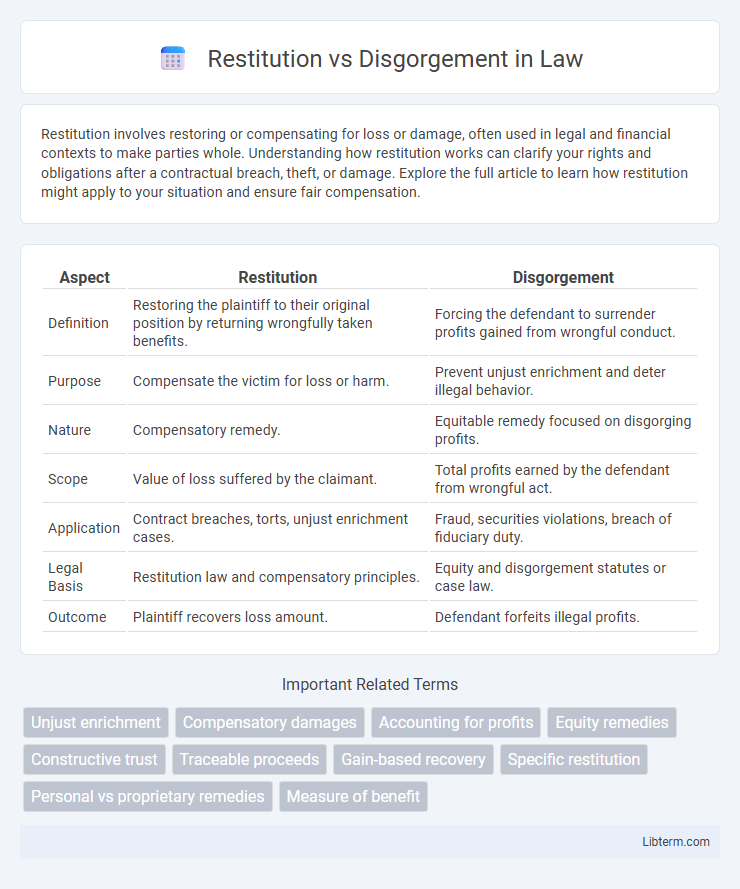Restitution involves restoring or compensating for loss or damage, often used in legal and financial contexts to make parties whole. Understanding how restitution works can clarify your rights and obligations after a contractual breach, theft, or damage. Explore the full article to learn how restitution might apply to your situation and ensure fair compensation.
Table of Comparison
| Aspect | Restitution | Disgorgement |
|---|---|---|
| Definition | Restoring the plaintiff to their original position by returning wrongfully taken benefits. | Forcing the defendant to surrender profits gained from wrongful conduct. |
| Purpose | Compensate the victim for loss or harm. | Prevent unjust enrichment and deter illegal behavior. |
| Nature | Compensatory remedy. | Equitable remedy focused on disgorging profits. |
| Scope | Value of loss suffered by the claimant. | Total profits earned by the defendant from wrongful act. |
| Application | Contract breaches, torts, unjust enrichment cases. | Fraud, securities violations, breach of fiduciary duty. |
| Legal Basis | Restitution law and compensatory principles. | Equity and disgorgement statutes or case law. |
| Outcome | Plaintiff recovers loss amount. | Defendant forfeits illegal profits. |
Understanding Restitution: A Legal Overview
Restitution is a legal remedy aimed at restoring the injured party to the position they occupied before a loss, typically involving the return of specific funds or property wrongfully taken. It focuses on compensating the plaintiff by recovering the exact amount lost due to unjust enrichment or breach of contract. Courts apply restitution to prevent unjust enrichment and ensure equitable relief by returning benefits unjustly received rather than punishing the defendant.
What Is Disgorgement? Key Definitions
Disgorgement refers to the legal remedy requiring a party to surrender ill-gotten gains obtained through wrongful or illegal acts, aimed at preventing unjust enrichment. It focuses on the amount of profits earned from misconduct rather than compensating the victim's losses. Key definitions include "wrongful gain" as profits directly linked to the violation, and "unjust enrichment" as the principle guiding disgorgement to restore fairness.
Core Differences Between Restitution and Disgorgement
Restitution focuses on compensating the plaintiff by restoring the defendant's unjust enrichment, typically measured by the benefit conferred to the plaintiff. Disgorgement aims to strip the defendant of ill-gotten gains, prioritizing the defendant's wrongful profits rather than the plaintiff's loss. The core difference lies in restitution seeking to prevent loss to the plaintiff, while disgorgement targets preventing the defendant's unjust enrichment.
Legal Foundations of Restitution Claims
Restitution claims are founded on the principle of preventing unjust enrichment by requiring a party to return benefits wrongfully obtained, typically anchored in equitable remedies and contract law. Legal foundations emphasize the defendant's possession of a benefit at the plaintiff's expense, mandating the restoration of that value to restore fairness. Unlike disgorgement, which focuses on depriving wrongdoers of their ill-gotten gains, restitution aims specifically to compensate the plaintiff for losses or restore the status quo ante.
When Is Disgorgement Appropriate in Law?
Disgorgement is appropriate in law when a defendant has wrongfully obtained profits through illegal or unethical conduct, and the court seeks to prevent unjust enrichment by ordering the repayment of those gains. It focuses on stripping the wrongdoer of ill-gotten benefits rather than compensating the victim, typically applied in cases involving securities fraud, insider trading, or breach of fiduciary duty. Courts use disgorgement to deter wrongful conduct and promote equity without requiring proof of the plaintiff's actual losses.
Remedies: Restitution vs. Disgorgement in Practice
Restitution aims to restore the injured party to their original position by returning specific benefits wrongfully taken, often emphasizing the plaintiff's loss. Disgorgement focuses on depriving the wrongdoer of unjust enrichment by requiring them to surrender profits gained through misconduct, regardless of the plaintiff's actual loss. In practice, courts apply restitution for compensation scenarios, while disgorgement serves as a deterrent in cases involving fraud or breaches of fiduciary duty, reflecting distinct remedial purposes under equitable doctrines.
Case Law: Important Precedents on Restitution and Disgorgement
Case law such as *Kaiser Aluminum & Chemical Corp. v. Bonjorno* and *Merrill Lynch, Pierce, Fenner & Smith Inc. v. Dabit* delineates the boundaries between restitution and disgorgement by emphasizing the equitable principle of preventing unjust enrichment in restitution and the focus on forfeiting ill-gotten gains in disgorgement. Courts have consistently held in *SEC v. Fehn* and *SEC v. Palmisano* that disgorgement serves as a remedy to deprive wrongdoers of profits derived from securities violations, while restitution aims to restore victims to their original position. These precedents underscore the importance of intent, causation, and the nature of the gains in determining the appropriate remedy.
Restitution and Disgorgement in Contract Disputes
Restitution in contract disputes aims to restore the injured party to the position they occupied before the breach by returning unjust enrichment or benefits received. Disgorgement focuses on compelling the breaching party to surrender profits unjustly gained from the breach, regardless of the injured party's loss. Courts often distinguish restitution as compensatory, addressing loss, while disgorgement serves as a remedy to prevent unfair gain and deter wrongful conduct.
Comparative Remedies: Advantages and Limitations
Restitution restores the plaintiff to their original position by returning lost property or its value, focusing on compensating actual losses, while disgorgement requires the defendant to surrender ill-gotten gains, emphasizing preventing unjust enrichment. Restitution's advantage lies in equitable compensation tied to the plaintiff's loss, but it may be limited when calculating exact damages or traceability. Disgorgement deters wrongful conduct by removing profits but can lead to overcompensation and challenges in determining the portion attributable to illegal activity.
Choosing the Right Remedy: Factors Courts Consider
Courts consider factors such as the nature of the wrongdoing, the defendant's intent, and the extent of unjust enrichment when choosing between restitution and disgorgement. Restitution aims to restore the plaintiff's losses by returning specific funds or property, while disgorgement focuses on depriving the defendant of ill-gotten gains. The degree of causation and the presence of equitable considerations also influence the choice of the appropriate remedy.
Restitution Infographic

 libterm.com
libterm.com